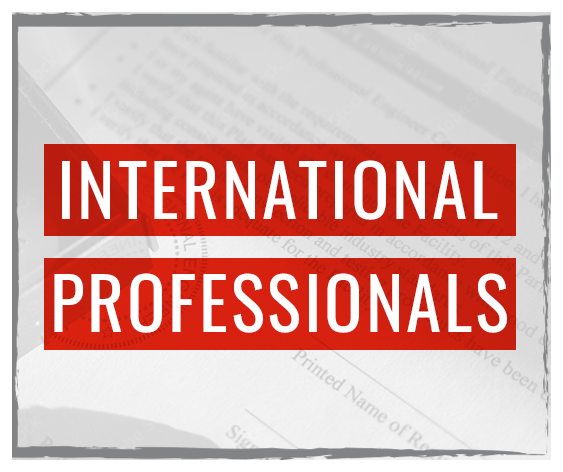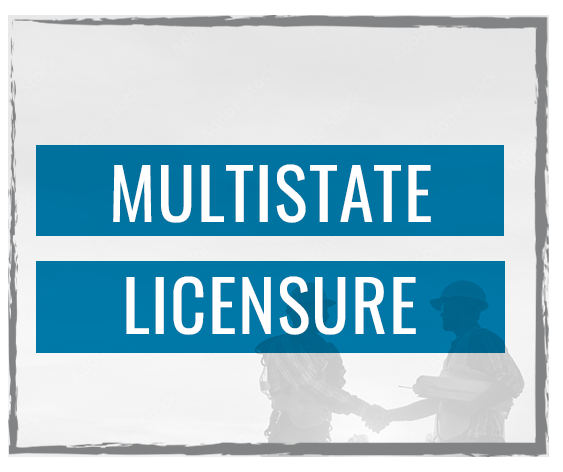
Professional engineering and surveying licensure helps ensure that individuals practice in a manner that protects the health, safety, and welfare of the public by satisfying qualifications in education, work experience, and exams. Licensure can help engineers and surveyors progress in their careers while at the same time providing public protection.
These steps reflect the most commonly accepted path to licensure. Many states provide additional paths for licensure. Candidates interested in pursuing licensure are encouraged to verify the requirements in the state or territory where they plan to practice.
Engineering Surveying Engineering
Generally, engineering licensing boards require P.E. candidates to have a bachelor’s degree from an EAC/ABET-accredited program.

Most states require four years of acceptable, progressive, and verifiable work experience.*

Licensure candidates typically must pass the FE exam and the PE exam. *
* These steps reflect the most commonly accepted path to licensure. Many states provide additional paths for licensure. Candidates interested in pursuing licensure are encouraged to verify the requirements in the state or territory where they plan to practice.

Generally, surveying licensure boards require P.S. candidates to have a bachelor’s degree from an ABET-accredited surveying program.*

Most states require four years of acceptable, progressive, and verifiable work experience.*

Licensure candidates typically must pass the FS exam and the PS exam, as well as a state-specific exam.*
* These steps reflect the most commonly accepted path to licensure. Many states provide additional paths for licensure. Candidates interested in pursuing licensure are encouraged to verify the requirements in the state or territory where they plan to practice.
“Being a P.E. means you are conscientious and always looking out for the health, safety, and welfare of the public.”
Kelly Becker, P.E.
“Obtaining a P.E. license provided immediate credibility as to my engineering skill set and enabled me to develop as a leader of other engineering practitioners.”
Mike Vonesh, Ph.D., P.E.
“A P.E. license prepares you for scenarios where the use of a license is necessary because some engineering companies self-perform or have design contract awards that will require drawing certifications to support their customers.”
Kevin Edwards, P.E., MBB
“Professional licensure protects the public from people who are not competent to perform land surveying and gives us a basis for minimum competency and requires us to follow the statutes within our jurisdiction.”
Amanda Allred, P.L.S
“Right now, the demand for professional surveyors is extremely high, and I take pride in knowing I’m qualified to provide this vital service.
Scott Bishop, P.S.
“Once I got licensed, the doors of opportunity really opened up for me. At the time I was pursuing my license, I didn’t know that I would eventually have my own survey business. Without my license, it would not be possible for me to have my own business.”
David P. Acosta, P.S.
Gaining your P.E. license provides you with an abundance of resources and networking opportunities that will aid with your career development. It will allow you to obtain the recognition needed to kickstart and further your career.
In order to experience both growth and security, it’s important to gain licensure. An increasing number of employers at all levels are requiring licensure. It can protect you during times of industry downsizing or outsourcing.
Even if you’re entering a career opportunity that does not require you to have a P.E. license, gaining one will provide you with career mobility and open new doors.
Attaining your P.E. license will provide you with more authority. You’ll be able to be an engineering consultant, be a credible expert witness, or even open your own engineering firm. Only a licensed engineer can prepare, sign, seal, and submit engineering drawings.
NCEES members are the 69 engineering and surveying licensing boards from all 50 states, the District of Columbia, Guam, Northern Mariana Islands, Puerto Rico, and the U.S. Virgin Islands. The individual members of these state licensing boards are appointed to serve by their respective governors and are considered active members of NCEES.
NCEES serves as an organization through which its member licensing boards may act and counsel together to better discharge their responsibilities in regulating the practice of engineering and surveying as it relates to safeguarding the health, safety, and welfare of the public.

Enforce standards that require licensed engineers and surveyors to practice in a manner that protects the public.

Protect the public by ensuring a baseline level of proven qualification and expertise.

Preserve the credibility, validity, and reliability of the engineering and surveying license.


In our everyday lives, we take a lot of the things that professional engineers and surveyors do for granted. Professional engineers and surveyors are constantly working to help safeguard the health, safety, and welfare of the public. Advance: An NCEES Podcast Series highlights the work of licensed professionals within the engineering and surveying fields and provides updates on important topics related to professional licensure.
200 Verdae Boulevard, Greenville, SC 29607
800-250-3196
© 2024 National Council of Examiners for Engineering and Surveying | An Engenius website
Society for Mining, Metallurgy, & Exploration Inc. Society of Petroleum Engineers222 Palisades Creek Drive
Richardson, TX 75080
Phone: 972-952-9393
Fax: 972-952-9435
Email: [email protected]